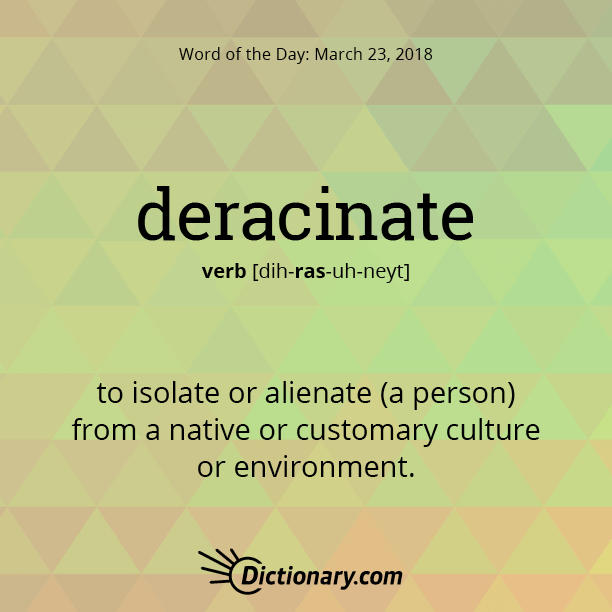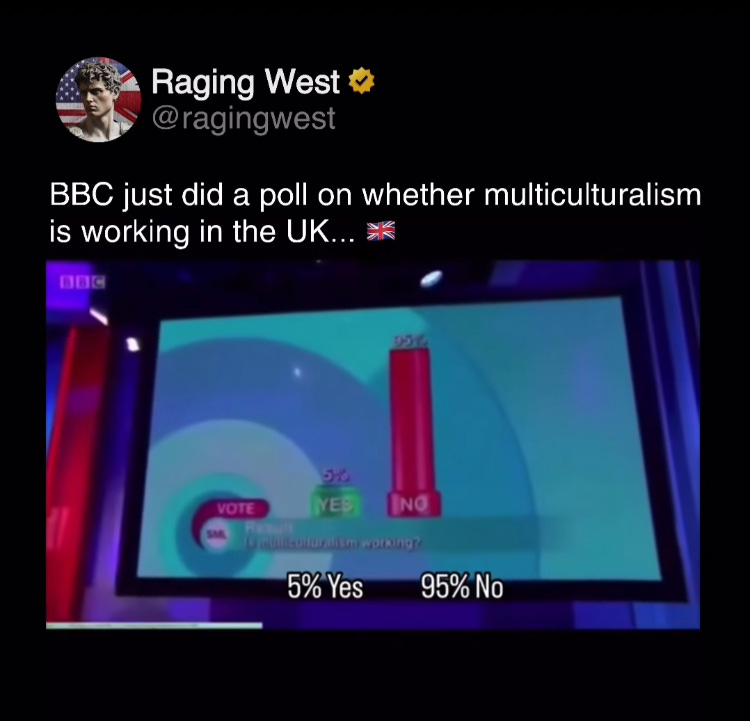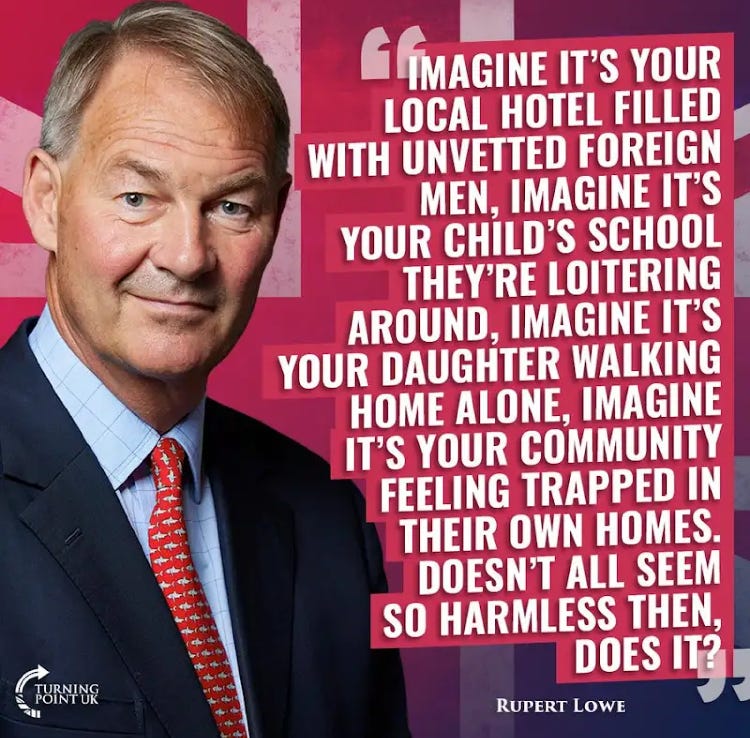The negative effects of immigration are facts which can’t be openly acknowledged. Immigration has created problems which can’t be publicly addressed.
All of this confusion and social damage is perversely beneficial for the power ambitions and financial incentives of the managerial class. It’s corrosive to ethnic identity and the maintenance of high trust societies and the observance of fiscal rectitude, but these are costs which the regimes are mostly willing to pay.
The strange thing is that they won’t admit that they’re doing it.
We used to live in an immediate, tactile world. Chaotic, unfair, often tragic… but effect followed cause and there was a certain basic logic to human events. Social reality was a matter of face-to-face interactions. Social norms were those ideas and expectations that you were taught by parents and teachers. Sometimes a new idea would make it through the institutions or the layers of hierarchy and be tested (over decades, generations) and if it worked it might be incorporated into the cultural package. Feedback mechanisms were everywhere: if rules led to crime, they were changed. If values led to social collapse or pathology, they were discarded.
If people near your town were causing problems, they were seen as a social ill and they were dealt with. If a stranger burnt down your neighbor’s home that stranger was perceived as a risky element, and deserving of punishment. If people were lazy, they’d be less likely to be hired, and they’d either change or starve or move on, hoping for a kinder or more credulous social setting. If a woman was loose, her social status would suffer.
As I said, these reflexive social norms weren’t always fair and they often created victims and generated suffering, but they existed for a reason. They existed to calibrate social incentives and disincentives in order to arrive at a safer, more productive, more harmonious society. They were broadly effective. If they weren’t, they disappeared.
Now we live in a very different world. People are taught certain ideas in college, and they’re encouraged to invest emotionally in their belief and display. ‘Experts’ and ‘journalists’ often sign off on these notions. They might be of dubious value, in light of all the data. They might even fly in the face of basic human nature (punishments usually reduce a behavior… rewards usually increase it… status is important for children and adults alike, but in different ways… men and women compete with and for each other very differently…) but the ideas remain, partly due to their emotional comfort and partly due to their attendant status rewards. These are not the pragmatic, generationally-tested social rules of the past. These are idealistic constructs- envisioning the world as it should be (according to certain class sensibilities and academic assumptions) and then imposing that vision upon reality.
:Unfortunately, during the Napoleonic wars, a lot of people fled Germany, and they landed in the United States and Britain. They brought with them the air of continental sophistication (as well as really good beer), and they were—like their Chinese mirrors—excellent mandarins. They quickly found places of power and influence in government and corporate America.
Speaking of beer, if you wouldn’t mind cutting down by one-glass-per-month, your contribution would help me keep my family fed and sheltered this year—and it’ll get you access to some nifty bonus content that’s now coming out every week.
And they brought with them German Idealism, from which comes state-controlled schooling, state welfare, the centralized regulatory state, and a number of other things we now take for granted that, nonetheless, have deeply undermined the entire nature of the American experiment.
Idealism is a philosophical tradition that stretches back into the Early Enlightenment and sees the world as the raw material from which to achieve an ideal. An idealist throws (and twists) him or herself into any shape necessary in service of an ideal, and is generally willing to do the same to others—well, wouldn’t you, if the promise was the achievement of a utopian vision?
In its formal philosophical form at the social and political level, Idealism promises secular salvation and redemption of the world through the proper corralling of the people under the dictates of The State (or The Company). The leader that can successfully do this can effect the perfection of his society and secure his culture in the camp of goodness, righteousness, and prosperity for all time.
Political imperatives - the driving project to change the world, and make it more equitable (managed), inclusive (ideologically homogenous), and progressive (contemptuous of past social solutions) structure the entire framework, and set the limits of inquiry. Feminism isn’t contributing to low birthrates, and even if it is no one can discuss that in any sense within the dominant institutions. Bail reform hasn’t led to the demoralization of police and the erosion of public order in dozens of large American cities, and even if it has no one can discuss that in any sense within the dominant institutions. ‘Net zero’ policies aren’t trading millions of jobs and generational amounts of wealth for negligible and purely abstract changes to global climate, and even if they are no one can discuss that in any sense within the dominant institutions.
Ultra-liberal immigration policies aren’t leading to a rash of crime and social degeneration and the complete breakdown of high-trust cultures. Even if they are, no one can talk about that. It’s a reality that almost anyone can observe, in a hundred different ways (especially if you live in a city or near one of the thousands of facilities whose managers are growing wealthy on government contracts) but it’s a topic that has been disallowed and rendered taboo, not just in polite conversation but in any institutional setting or program or policy debate. The implications are too unseemly for our technocratic managers and therefore the obvious reality - immigration from very different places has led to massive social disintgeration and violence (especially sexual) and left people less trusting and feeling less safe - is unspeakable. This glaring social problem, this open and festering sore on the political body of multiple countries cannot be acknowledged or addressed or debated. Enormous energy is expended to plaster over the cracks, and silence the dissenters, and bury the exposés. The status of many professionals hangs upon their conformity to this thought regime.
But the whole thing is transparently and obviously false. If these problems were being considered and addressed, then surely we could talk about them? What more evidence is needed that the bureaucratic superstructure is brittle and fearful of open discussion? The enforced silence is, effectively, the blinking red alarm light indicating dangerously unstable conditions in our social machinery, and the regime has chosen their approach to this rising instability and increasing social friction: more soft repression. More influence campaigns. More fantastical advertising and education initiatives and professional trainings. More police visits and intelligence agency surveillance, and more arrests.
Just as their efforts (vis-a-vis nonprofits and make-work programs and transfer payments and government schools) cannot meaningfully address the consequences of dangerously irresponsible border policies, their efforts to quiet the growing clamor through information management and panoptical monitoring (with randomly distributed legal penalties and reputational damage) will not work. It can’t. In recognition of their impotence, the government will lean ever harder on the levers of punishment and coercion.
The second possible choice, besides accepting fallibility and opening oneself up for change, is to revert to coercion and compulsion. If you go down that road, eventually compulsion will be all that you have at your disposal (and, since it is the easiest and most powerful tool of the state, it will begin to be used more and more). That is the direction that Great Britain and Germany are travelling today. The British psy-ops and advertising campaigns and NGO initiatives and profoundly anti-democratic policies (anti-democratic in the sense of being against the policies that the people badly want) aren’t working fast enough, and resistance is rising. Efforts are being redoubled, of course. Just look at the at burst of elite excitement around the release of Adolescence.
Awhile ago I wrote about ‘horizontal information flow'. In a complex, state-level society we have been relying on institutions to form our picture of the wider world. These institutions are full of people who have been trained and molded to believe certain assumptions and prioritize certain values, and where their personal education leaves gaps, their class imperatives and status incentives take over. All of these dynamics enforce conformity, and they protect the people who are caught in them from exposure to alternate ideas or criticism.
This is the institutional and bureaucratic mode of information transmission. Its defenders will claim that this mode is preferable because it’s more reliable and that it’s more professional and credentialed (which is a bit of circular reasoning). Perhaps that used to be true, and perhaps it still is in certain cases, but it can’t be true across the board because institutions are refusing to acknowledge or address or debate massive social problems. In effect, policymakers and their lickspittles and intellectual toadies are rushing to assure people that they can be trusted, and that they are transparent and rigorous in their activities, and that they do prioritize the collective good and the children’s futures and blah blah blah while they rush to assure you that the knife crime and the squalid encampments and the peaceful citizens being surveilled and visited by police and the ominous and disorderly migrant barracks, springing up near parks and schools do not exist. Maybe technically they exist… but they’re nothing to worry about you see. They’re not a problem.
What they would probably say, if they weren’t representing a vast and malign bureaucratic machine, is that the migrants and the misery and violence and fear that they sometimes occasion aren’t a large concern for them. They have other concerns and other priorities and for some of those priorities (public funding and demographic change and the decentering of racial and historical identity) the waves of visitors are often quite useful. There may be costs, of course, but you will pay those. You: the hoi polloi, the contemptible natives-pensioners and workers and white men. It’s high time you paid anyway! We won’t pay those costs. We will reap the benefits. We: the policymakers and politicians and journalists and researchers and educators. The people standing at the chokepoint of power and cultural control, and keeping the gates narrow and exclusive. The future looks bright for us.
Great Britain is the case study par excellence for this dynamic, but Germany is also a prominent example. Understand that these two countries have proven much more intransigent to address immigration concerns through executing of democratically approved policies because these countries are only partially democratic. Democracies require many vital power centers in a society, and institutional safeguards against the abuse or spillover of power (plus mechanisms for representing the will of the people). Great Britain has those mechanisms, but they’ve proven to be completely useless against a bureaucratic class that essentially thinks and operates with one mind and which controls the courts, the universities, the government agencies, the educational credentiallers, the researchers, regulators, NGO’s, and the financial sector.
British voters have been clamoring for years (over two decades at this point) to steeply restrict immigration into Great Britain. Multiple cycles of government have been elected on that promise and then completely ignored their remit. This issue has probably done more to damage the Tories than any political development in the past half-century, but the Tory politicians are also part of this managerial class. They would rather maintain class discipline and enforce the idealistic program of the bureaucracy. That program will lead to more rapes and stabbings and government debt, sure… but it will also generate a great deal of downstream political support and immediate organizational resources for allies, plus favorable cultural change for those who want to remake Britain and British identity. The managerial class do want that. They won’t admit it, of course, but what have they done to support or protect or bolster British identity? Now: what have they done to erode it?
This agenda is international. It’s anti-national, in fact, but it uses national institutions and systems. It is a novel development in world political history. While the project might be proceeding farther and faster in certain European countries, it was carried out ceaselessly for years in the United States, and it is still the official government policy in Canada, which has now been refashioned forever.
It’s difficult to parse exactly what the web of power relationships and motivations are lying behind all of this, for they are maintained in strict secrecy and protected behind a veil of dissembling and distraction. It seems clear that the open borders project is somehow connected to the bail reform project (in the United States) and the two-tier policing project (in Britain) and the ‘anti-far-right extremism’ project (in Germany). All of these priorities are consistently supported by the NGO complex, the intelligence agencies, and legacy media.
The examples are literally endless at this point. They never end, and they never will. Anyone who expected a frank and active response to these problems from policymakers was disabused of that hope many years ago. This is a problem which everyone can see. Some admit it’s a problem. Some claim that it’s not problem at all… but those latter people cannot be trusted, for they won’t even admit that the changes are happening, or that there’s a coordinated agenda behind them. In other words, they deny a coordinated agenda while executing a coordinated agenda.
The real question should be: why would a regime expend so much energy and credibility and political capital in order to protect and fuel such an unpopular and alien social and cultural change? What is in it for them?
That’s the question we should all be asking.
In the meantime, share the information. There are still millions of people who are comfortably insulated from reality, by government announcements and legacy media content. It’s all pretty shocking.




















































Because these people in charge of us are Globalists. National identity, heritage, history and pride mean nothing to them. The people that live in the countries they head mean nothing to them. We're just numbers on a ballot sheet or data on a graph. And we we're making enough people so they imported more. That's all. After all, they are going to need lots of bodies from the next Big War and conscripting immigrants and offering them a pathway to citizenship is a time honored tradition going back to Roman times. We're utterly replaceable to these people old chap, they won't even notice we've gone.
It’s not clear to me exactly why the Biden administration decided that it was a good idea to open our borders to millions of unskilled, uneducated people. Allowing a relative small number of the well educated in each year is probability a good idea.
This was one of the most disastrous policies the country has seen in my long lifetime. Importing millions of people who will work for next to nothing just to be here undermines the wages of our working class and exacerbates our national housing crisis when we can’t house our own citizens. It consumed billions of our tax dollars which could have been put to better use.
The age of mass migration is over. People cannot overpopulate their home country and just expect to move to greener pastures. There are no more green pastures. They need to voluntarily reduce their country's population to an environmentally sustainable level, stay there and work to improve their living conditions.
I still don’t understand those who say that we should not deport the majority of these interlopers. They violated our laws and continue to violate them. No one believes that they have a right to visit Paris as a tourist, rent an apartment and live their life there without the permission of the French people and no one would argue that the French have no right to kick them out of that country. Why do the same rules not apply to the United States? They clearly do.